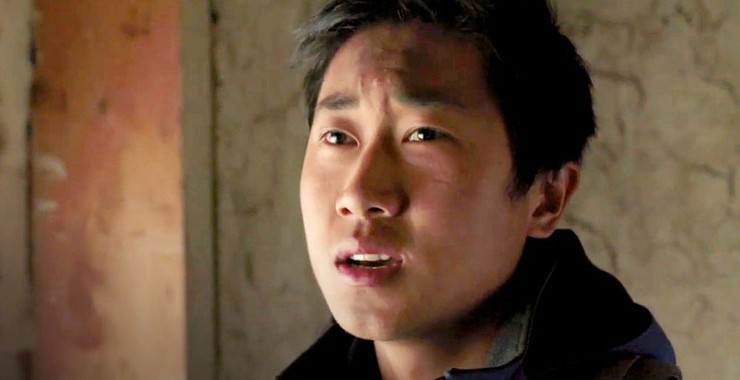




Perhaps you’ve heard of the Himalayan nation of Bhutan’s pursuit of “Gross National Happiness.” It’s this gloriously progressive ideal aimed at prioritizing well-being and a satisfying, even joy-filled life over international capitalism’s national scorecard — gross domestic product.
But who knew this remote, impassibly mountainous country could export that?
“Lunana: A Yak in the Classroom” is a sweet, understated and wistfully beautiful film about an antsy young cynic sent to teach in the most remote schoolhouse on Earth. He is ordered to Lunana to fulfill his national service. What he’d prefer is traveling to Australia to sing English language pop covers in the bars on Bondi Beach.
But what’s a self-absorbed lad to do when the entire village worshipfully welcomes him, pouring respect on a teacher, someone who “can touch the future?” What’ll he do when he sees the eager faces of the moppets who will be under his care?
If he’s like a lot of people who watch this film, Bhutan’s first-ever contender as a Best International (foreign language) Feature at this year’s Academy Awards, he might just cry.
Writer-director Pawo Choyning Dorji’s debut feature starts in the city where Ugyen Dorji (Sherab Dorji) is getting a good, old-fashioned chewing-out from his government supervisor. A nation filled with yak herders and monks is a place where most folks would sacrifice everything for a government job. Ugyen would rather play his guitar and sing Creedence Clearwater Revival’s “Have You Ever Seen the Rain?” He’s waiting for his travel visa to clear so he and his girlfriend can escape to Australia.
“I have never SEEN anyone less motivated that you” his boss hisses (in Dzongkha, with English subtitles). He’s been a bust at the city schools of Thimphu. As he owes one last year of service, maybe shipping his shiftless behind to Lunana, in the literal middle of nowhere, will change his ways and help the government reopen the school there, passing “gross national happiness” on to the 56 or so souls who inhabit the place.
“I have an altitude problem!” he lies. “Are you Bhutanese? “ATTITUDE problem’ is more like it!”
After a sluggish start, “Lunana” gets on its feet and on the road. Ugyen sets off — a day by bus, seven days of hiking and complaining — just to get to the village 4,800 meters up.
He and his guide Michen (Ugyen Norbu Lhendup) pass through settlements down to their last three residents, wade streams where his market-stall bought “Gortex” waterproof boots turn out to be knockoffs, and climb through some of the most breathtaking scenery on Earth.
Michen has noticed the snow pack shrinking, even though he’s never heard the phrase “Global Warming.” Ugyen barely notices. He’s got his headphones on, listening to his jams on his phone. He may expect his cell service coverage to end, but he has no idea how hard even recharging the thing will be.
“Solar…sometimes it works, sometimes it doesn’t.”
And that’s the least of his problems. The ancient stone school has no supplies. His living space for the summer and fall — he is due to leave before the snow blocks him in — is Spartan and cold, with only yak dung to burn for warmth and cooking. He meets the respectful head man (Kanzang Wangdi) and the villagers who hike for hours to escort him in, and cannot disguise his dismay or hold his tongue.
He doesn’t want to be here, and is ready to leave. Now.
But as in a thousand other “fish out of water” tales, things change, attitudes soften. The “class captain,” little Pem Zam, is too cute for words, eager to learn and awfully helpful since Ugyen no longer has a cell phone alarm to wake him in time for school.
He finds himself improvising, using charcoal on the walls since there’s no blackboard. He’s bilingual, so he teaches nursery rhymes in Dzongkha, math in English. Might he fit in? Be useful after all?
“Maybe I was a yak herder in a previous life,” he jokes to the head man. “Oh noooo. You could have been a YAK. They are so useful to our people.”
And then there’s this other singer in town, a yak herder with an angel’s voice. She’s cute, too.
Writer-director Dorji has a few stumbling steps out of the gate, with characters’ awkwardly running through paragraphs of exposition filling in Ugyen’s unhappy childhood and his inescapable fate in early scenes. But his debut feature settles down and immerses us in rituals — offering yak milk to shrines in mountain passes, not to the dead but to the spirits of the mountains — and Bhutanese life, which is simple enough to be called impoverished by much of the rest of the world.
The film invites us to imagine interior lives, a narrowing of the “pursuit of happiness” to tasks at hand, modest goals, music, food and love.
As our pandemic waxes and wanes, “Lunana” becomes one of the great cinematic escapes of recent years.
You go ahead and root for the Japanese “Drive My Car” this Oscar night. I’ve picked out an underdog to pull for, and a bucket list place to visit, “altitude problems” be damned.
Rating: unrated
Cast: Sherab Dorji, Pem Zam, Ugyen Norbu Lhendup, Kelden Lhamo Gurung and Kunzang Wangdi
Credits: Scripted and directed by Pawo Choyning Dorji. A Samuel Goldwyn release.
Running time: 1:50

